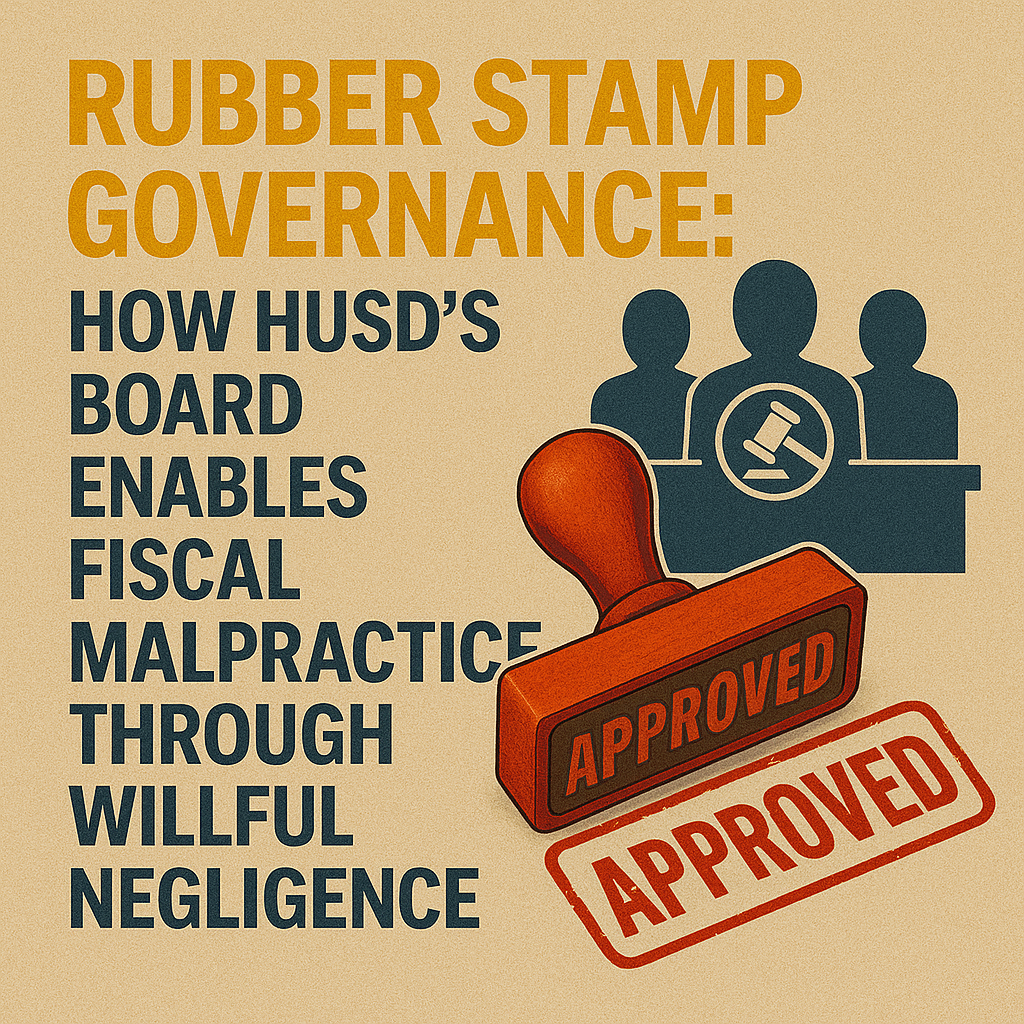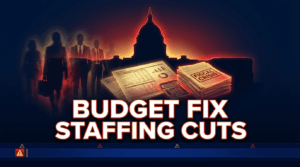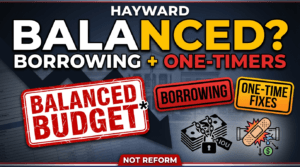Rubber Stamp Governance: How HUSD’s Board Enables Fiscal Malpractice Through Willful Negligence

Board President Bufete and trustees approve millions in spending without questions while district burns through taxpayer money
By Tom Wong, Independent Investigative Reporter
July 7, 2025
The most shocking aspect of Hayward Unified School District’s financial crisis isn’t the deficit spending, contractor dependency, or administrative bloat. It’s the complete abdication of oversight responsibility by Board President Peter Bufete and his fellow trustees, who rubber-stamp millions in questionable expenditures while offering empty platitudes about “serving students.”
My investigation of recent HUSD board meetings reveals a disturbing pattern: trustees treat massive financial decisions as routine “consent items” requiring no discussion, ask no substantive questions about budget failures, and enable administrative incompetence through willful negligence. This isn’t governance — it’s institutional malpractice that betrays every taxpayer who trusted them with fiduciary responsibility.
The Consent Calendar Scam
HUSD’s board routinely approves massive expenditures through “consent calendar” procedures designed for routine, non-controversial items. Recent examples include:
June 25, 2025 Consent Items:
- $9+ million in special education contractor agreements
- $500,000+ in facilities and maintenance contracts
- Multiple six-figure professional service agreements
- Personnel appointments with undisclosed compensation
These multi-million dollar decisions receive zero individual discussion. Board members vote once for all consent items combined, eliminating accountability for specific spending decisions.
May 28, 2025 Consent Items:
- Over $200,000 in construction and facilities contracts
- Change orders increasing project costs without explanation
- Professional service agreements lacking performance metrics
The consent calendar has become a mechanism for avoiding oversight rather than streamlining routine business.
The Question-Free Zone
My review of board meeting transcripts reveals a shocking pattern: trustees ask virtually no substantive questions about fiscal management, budget performance, or contractor accountability.
Typical Board “Oversight”:
- Superintendent presents budget with continued deficit spending
- No questions about causes or solutions
- Administrative staff recommends contractor agreements
- No questions about cost-effectiveness or alternatives
- Massive expenditures approved without discussion
Board President Bufete and trustees Sara Prada, Austin Bruckner Carrillo, Dr. April Oquenda, and Ken Rawden treat their role as ceremonial rather than supervisory.
The Financial Literacy Crisis
HUSD board members demonstrate stunning ignorance of basic financial management principles:
Evidence of Financial Illiteracy:
- Approval of budgets with continued deficit spending
- No questions about reserve fund depletion
- Acceptance of forecasting failures without accountability
- Inability to distinguish between one-time and ongoing revenues
- No demands for cost-benefit analysis of contractor agreements
These aren’t complex financial concepts — they’re basic principles that any competent board member should understand.
The Accountability Vacuum
When HUSD administrators admit systematic failures, board members respond with silence:
Administrative Admissions Met with Board Silence:
- “We are continuing to deficit spend”
- “Positions funded with one-time revenues that are due to expire”
- “Due to staffing shortages” (repeated in multiple contractor justifications)
- “No bids were received” (forcing no-bid contracts)
Any competent board would demand explanations, timelines for correction, and accountability measures. HUSD’s board simply nods and approves more spending.
The Meeting Theater Performance
HUSD board meetings follow a predictable script designed to minimize oversight:
Standard Meeting Format:
- Administrative presentations with cherry-picked data
- Brief “board questions” period with softball inquiries
- Limited public comment with time restrictions
- Consent calendar approval without discussion
- Administrative praise for “serving students”
This format eliminates meaningful oversight while creating the appearance of governance.
The Public Comment Suppression
HUSD’s board systematically limits community input on fiscal matters:
Public Comment Restrictions:
- Two-minute time limits for complex budget issues
- No questions allowed during administrative presentations
- Consent items bundled to prevent specific criticism
- Meeting schedules that discourage working parent participation
When taxpayers do raise concerns, board members offer generic responses without committing to specific actions.
The Committee Charade
HUSD maintains numerous committees that should provide oversight but function as administrative enablers:
Ineffective Committee Structure:
- Budget committees that don’t question spending
- Audit committees that ignore performance failures
- Facilities committees that rubber-stamp contractor agreements
- Policy committees that avoid controversial reforms
These committees provide the appearance of oversight without actual accountability.
The Information Asymmetry Problem
Board members receive information not shared with the public, creating accountability gaps:
Hidden Information:
- Detailed salary and benefit data for administrators
- Contractor performance evaluations and metrics
- Long-term fiscal projections and scenarios
- Comparative cost analysis with other districts
This information asymmetry allows administrators to control narratives while limiting public oversight.
The Conflict of Interest Web
HUSD board members have potential conflicts that compromise independent oversight:
Potential Conflicts:
- Employment relationships with district vendors or contractors
- Political relationships with administrator appointments
- Social connections that compromise independent judgment
- Financial interests in district decisions
These conflicts aren’t properly disclosed or managed, compromising board independence.
The Legal Compliance Failure
HUSD’s board fails to ensure compliance with basic legal requirements:
Legal Compliance Gaps:
- Inadequate budget transparency and reporting
- Procurement violations through no-bid contracts
- Public meeting law violations through consent calendar abuse
- Fiduciary duty breaches through negligent oversight
These failures expose the district to legal liability while undermining public trust.
The Comparative Governance Analysis
Successful school districts have boards that actually govern:
Effective Board Practices HUSD Ignores:
- Regular budget monitoring with course corrections
- Detailed questioning of administrative recommendations
- Independent analysis of major expenditures
- Public accountability for performance failures
- Transparent decision-making processes
The Training and Competency Crisis
HUSD board members lack basic governance training:
Missing Competencies:
- Financial oversight and budget analysis
- Procurement law and competitive bidding
- Performance management and accountability
- Strategic planning and priority setting
- Public meeting law and transparency requirements
Rather than developing these competencies, board members defer to administrators who created the problems.
The Term Limit Solution
HUSD’s governance failures stem partly from entrenched board members who’ve lost perspective:
Board Tenure Analysis:
- Long-serving members who’ve normalized dysfunction
- Lack of fresh perspectives and independent thinking
- Comfortable relationships with failed administrators
- Resistance to change and accountability measures
The Real Cost of Failed Governance
HUSD’s board failures impose real costs on taxpayers and students:
Governance Failure Costs:
- Millions wasted on unnecessary contractor agreements
- Administrative bloat enabled through lack of oversight
- Budget crises caused by negligent financial monitoring
- Student services cut while administrative spending grows
- Public trust eroded through lack of accountability
What Effective Governance Looks Like
Competent school boards provide real oversight:
Effective Board Practices:
- Individual review and discussion of major expenditures
- Regular questioning of administrative performance
- Independent verification of budget claims
- Public accountability for fiscal failures
- Transparent decision-making with community input
The Reform Imperative
HUSD’s governance crisis requires immediate reform:
Essential Governance Reforms:
- Eliminate consent calendar abuse by requiring individual votes on expenditures over $50,000
- Mandate board training in financial oversight and governance principles
- Establish performance metrics for administrative accountability
- Increase transparency through public access to all board information
- Implement term limits to bring fresh perspectives
- Create independent oversight through citizen budget committees
The Bottom Line
HUSD’s board governance represents a complete failure of democratic accountability. Board President Bufete and his fellow trustees have abdicated their fiduciary responsibility to taxpayers by enabling administrative incompetence through willful negligence.
While collecting stipends and benefits for their service, board members rubber-stamp spending decisions that would be rejected by any competent oversight body. Their consent calendar abuse, question-free meetings, and accountability vacuum have created a system where administrative failure is rewarded with job security and increased resources.
The contrast with effective school boards couldn’t be starker. While competent trustees ask hard questions, demand accountability, and protect taxpayer interests, HUSD’s board functions as an enabler of fiscal malpractice.
Until HUSD replaces its failed board leadership with trustees who understand their oversight responsibilities, the district’s financial crisis will continue. Taxpayers deserve board members who govern rather than rubber-stamp, who ask hard questions rather than offer empty praise, and who protect public resources rather than enable administrative excess.
The governance crisis at HUSD isn’t a technical problem requiring consultant studies — it’s a leadership failure requiring immediate voter action. Every election cycle that returns these failed trustees to office is another endorsement of fiscal irresponsibility and administrative incompetence.













